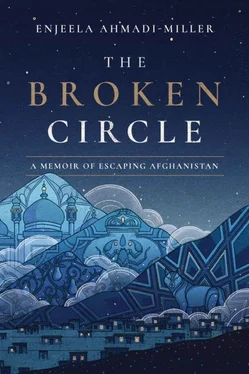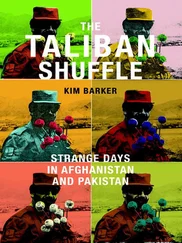I shot up from my seat. “You’re sending us back!”
“Enjeela, please,” Padar said, reaching toward me.
“You can’t send us back,” I yelled. “You can’t.”
“Please, little girl,” the officer said. “You must understand—”
“We have to get to India,” I shouted at him. “We’ve traveled for nearly two years to get here.”
“That is no concern—”
“You can’t stop us from going to India.”
His grin became more resolute. He folded his arms over his chest, and for the first time, his eyes hardened. “There is a flight tomorrow that will take you to Islamabad. You will be met—”
“No, no, you can’t send us back.” I couldn’t hold back my tears. I felt a warm hand on my shoulder.
“Enjeela…”
I shrugged it off. “If you send us back, they will put us in jail. They will beat us like they’ve done to so many others, they will kill us!”
He shook his head. “That is none of my concern. You can’t come here illegally and expect to be greeted with open arms.”
“Please, please, please,” I pleaded. All I could think of was all the grief we’d been through to reach Mommy, and I couldn’t accept this decision in silence. “You have to let us through so we can see our mother.” I reached out for his sleeve, but he fended me off.
“You can stay the night here. Be ready to travel in the morning.”
I fell to my knees and began screaming. I couldn’t control my voice, the words, the tears, the anguish; they poured out of me. “You have to let us go. You have to. You have to. We can’t return to Kabul. They’ll kill us. They’ll murder Padar.”
I was so weak I couldn’t lift my head. I don’t know how long I pleaded with him, but he stood over me in silence while I stooped on my knees, wailing with every bit of strength in my being. When I fell into convulsive weeping, he turned to the door and closed it hard behind him. The latch fastened on the other side. I remained on that floor for hours before my sisters and Padar were able to console me enough to get up onto the wooden bench. I laid my head in Padar’s lap, and I finally drifted off into a hazy sleep.
Sometime in the night, a guard opened the door, and Padar helped me to the restroom on the concourse. I went in with Laila and Zulaikha. We relieved ourselves, then washed our faces, and cleaned ourselves as best we could. My face had streaks from crying so hard. My dress was dirty from kneeling on that filthy floor. I rearranged my clothes the best I could to be presentable. Followed closely by the airport police, Padar led us to a restaurant that was open, and he purchased some rice and chicken. A guard stationed himself outside the restaurant.
I ate slowly, thinking of what it would be like arriving in Kabul. I could muster few feelings about returning. My crying had drained everything out of me. I felt like melting right through the plastic bench.
“How can they do this to us?” Laila finally asked, breaking the silence. None of us wanted to bring up the dismal subject of our deportation.
Padar ate rather languidly, not at all in a hurry. “There are always reasons to hope for the best to happen, children. Remember that. We are in the hands of Allah.”
Hands of Allah. Mina is also in the hands of Allah.
“Do you remember the poem by Hafiz?” he said.
Laila rolled her eyes. “Which one. You’ve told us hundreds.”
“Ah.” He smiled. “It’s called ‘Out of This Mess.’”
We all shook our heads. I could not recall it. Here in this cold café in the airport concourse, he lifted our spirits, reciting with his deep and resonant voice. He recited a poem about being humble and asking God for guidance and help. It gave me a sense of security.
My sisters and Zia laughed. I didn’t understand why they were laughing; maybe because we’d been through so much already. I felt stiff inside, and trying to laugh felt like peeling the scab off a fresh wound.
“I don’t see how being humble is going to get us out of this mess,” Zulaikha said.
“One never knows,” he said.
I admired that he always seemed, in these difficult moments, to keep things in perspective. His strength in God gave me strength to believe, even though at times I had grave doubts, that I was in the palm of my maker, and he was holding me there. My fatigue had not lifted, and my body struggled between sleep and panic. But the fear of being forced to return to Kabul had lifted. I had no way of knowing what would happen, but there had to be a way out of this mess.
After we finished, a guard escorted us to the gate of the Pakistan International Airlines flight that would take us back to Islamabad. We tried to make ourselves comfortable in the hard plastic seats of the waiting area. I must have dozed off for a few hours, because when Laila shook me awake with a yank of my arm, the room was flooded with early-morning light.
I rubbed my eyes. The sky outside the large windows overlooking the tarmac had brightened with a new day. Padar seemed optimistic this morning. As if help would show up from somewhere.
“Enjeela, look.” Laila tugged on my arm again.
A few feet away, near the row of seats adjacent to the concourse, the polished policeman who had spoken to us in that room stood talking to Padar.
“Come on.” I rose, and we sidled up next to Padar. I slipped my hand into his, and he clenched his warm palm around mine.
The policeman held a fistful of plane tickets. He tried to hand them to Padar, but Padar held his free hand up, palm out, not willing to take them.
“Listen, Officer, we are Muslim, and we need to pray. My family always attends morning prayers. You must let us go to the mosque.”
For the first time, the put-together policeman appeared a little confused about what to do. He looked down at me but wouldn’t meet my eyes.
“It’s not right that you refuse us. I have taught my children always to pray, and here we come to your country—”
“I have not refused you,” he said with a crisp tone. He glared at Padar. “I have not said what I will do.” He glanced up the concourse and turned half away from us with his arms folded tight against his chest, as if he looked for an answer from somewhere. “You want to pray, then you shall pray. But I insist you take these.” He handed the tickets over, and Padar took them. Then he handed over some bills. “This was left over from your purchase. I am expecting you and your family to be on that flight today at noon.” He turned to Padar. “There will be people expecting to greet you in Kabul. Do you understand me, Mr. Ahmadi?”
“Perfectly.”
“I will escort you to the taxi stand. The Baitul Mukarram mosque is a few miles from here. It is a most magnificent complex of buildings, one that often swallows people whole who do not know it well. But I’m certain a man of your intelligence will find his way around.” His stiffness seemed bred into him. He turned and marched away.
“Quick, gather your things,” Padar said to us. “Hurry, hurry.” We all ran to our things. I hoisted up my small suitcase and hitched up my backpack, slipping into the straps.
“Hold hands,” he commanded. He took mine, Zulaikha clasped my other one, and we descended an escalator, turned to the luggage area, and headed toward the glass doors leading to the street. The police colonel waited for us at passport control, at the very same booth of the big guard who had assaulted us so viciously yesterday afternoon.
When the officer appeared, the guards snapped up, standing at attention. He waved us to the front of the short line. We came up behind him.
“They are leaving,” he said, a stout look on his face. “They are going to Baitul Mukarram for morning prayers.”
Читать дальше












